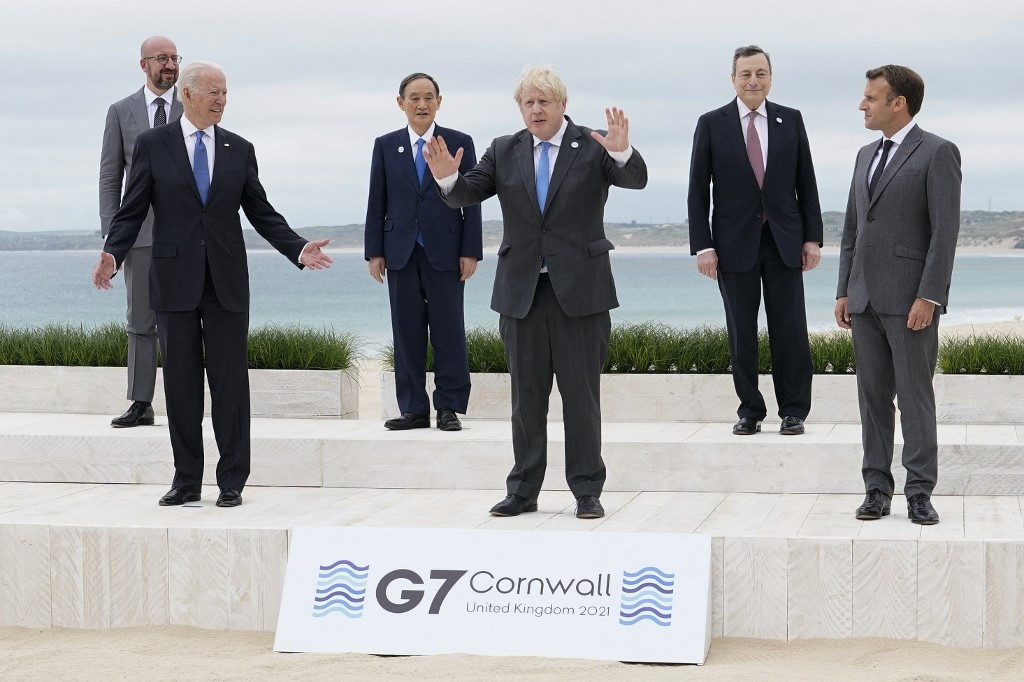Popular Reads
Top Results
Can't find what you're looking for?
View all search resultsPopular Reads
Top Results
Can't find what you're looking for?
View all search resultsG7 to launch infrastructure plan to counter China's Belt and Road
On the second day of the three-day summit in Cornwall, southwestern England, the G7 leaders discussed Beijing's alleged abuses of the Uighur Muslim minority in the Xinjiang region, western China, and Japanese Prime Minister Yoshihide Suga expressed "deep concerns" about human rights in China.
Change text size
Gift Premium Articles
to Anyone
 (left-right) President of the European Council Charles Michel, US President Joe Biden, Japan's Prime Minister Yoshihide Suga, Britain's Prime Minister Boris Johnson, Italy's Prime minister Mario Draghi and France's President Emmanuel Macron pose for the family photo at the start of the G7 summit in Carbis Bay, Cornwall on June 11, 2021. G7 leaders from Canada, France, Germany, Italy, Japan, the UK and the United States meet this weekend for the first time in nearly two years, for three-day talks in Carbis Bay, Cornwall. (AFP/Patrick Semansky)
(left-right) President of the European Council Charles Michel, US President Joe Biden, Japan's Prime Minister Yoshihide Suga, Britain's Prime Minister Boris Johnson, Italy's Prime minister Mario Draghi and France's President Emmanuel Macron pose for the family photo at the start of the G7 summit in Carbis Bay, Cornwall on June 11, 2021. G7 leaders from Canada, France, Germany, Italy, Japan, the UK and the United States meet this weekend for the first time in nearly two years, for three-day talks in Carbis Bay, Cornwall. (AFP/Patrick Semansky)
L
eaders of the Group of Seven industrialized countries on Saturday agreed on a new plan to provide financing for infrastructure in the developing world as an alternative to China's Belt and Road Initiative, a project critics say is intended to draw countries deeper into Beijing's economic orbit.
On the second day of the three-day summit in Cornwall, southwestern England, the G7 leaders discussed Beijing's alleged abuses of the Uighur Muslim minority in the Xinjiang region, western China, and Japanese Prime Minister Yoshihide Suga expressed "deep concerns" about human rights in China.
The agreement on the "Build Back Better World" initiative was reached as the leaders from Britain, Canada, France, Germany, Italy, Japan, the United States plus the European Union held a session focusing on China, an emerging economic powerhouse and strategic rival of the United States.
With the participation of the private sector, the initiative is intended to collectively catalyze hundreds of billions of dollars of infrastructure investment for low- and middle-income countries in the coming years, the White House said.
One of the US officials said that the new initiative will not just be an alternative to China's BRI but is believed to "beat" it by offering a higher-quality choice.
The G7 initiative will be global in scope, from Latin America and the Caribbean to Africa and the Indo-Pacific.
Chinese President Xi Jinping has advocated the BRI since 2013 to increase Beijing's influence abroad by financing and building infrastructure projects across Asia, Europe and Africa. It has faced questions for its record of saddling developing countries with debt.
While criticizing the BRI for its lack of transparency and poor environmental and labor standards, the US official said the G7 had so far not been able to offer a "positive alternative that reflects our values, our standards and our way of doing business."
The official noted that it is not the intention of the United States to force other countries to choose between the world's two largest economies, but rather to show to others that democracies are a better model than autocracies.
"As we come together on this partnership, our G7 partners have agreed that our real purpose here is to demonstrate that democracies and open societies can come together and deliver a positive choice to meet some of the biggest challenges of our time, not just for our people, but for people all over the world," he added.
US President Joe Biden has been rallying allies and like-minded countries to counter China's rise, framing the competition between the two countries as a contest between democracies and autocracies.
The demand for high-quality physical, digital and health infrastructure is high, the White House said, citing a World Bank estimate showing a cumulative $40 trillion worth of infrastructure needs in the developing world through 2035.
Such a project is likely to assist developing countries in recovering from the economic fallout of the pandemic, which fits with this year's G7 summit theme to "build back better" from the pandemic and create a greener and more prosperous future.
On allegations of Muslim Uighur minorities' forced labor by China, Biden made "forceful comments" on the need to publicly call out the issue, a senior administration official said.
The G7 leaders are scheduled to wrap up their discussions on Sunday, with a joint communique expected to be released.
The first day of the talks had centered on ways to help the world recover from the coronavirus pandemic and restore the pandemic-hit global economy.









